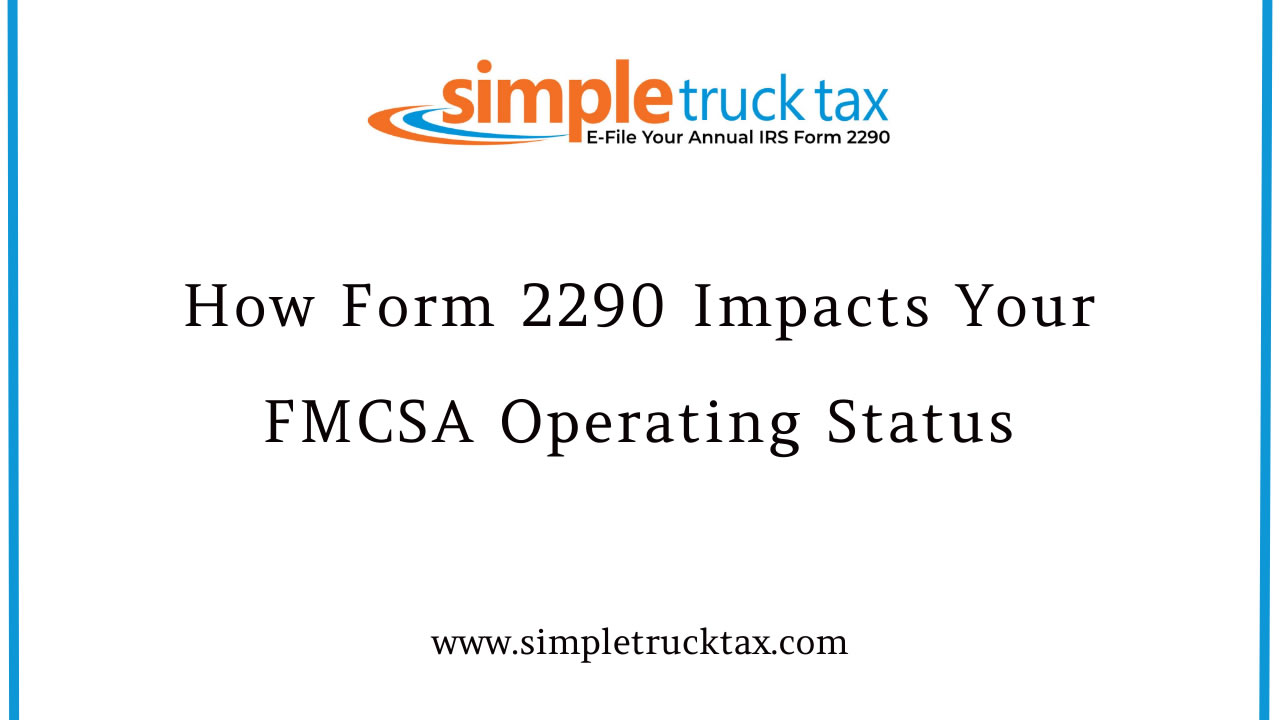
How Form 2290 Impacts Your FMCSA Operating Status
If you drive heavy vehicles on public highways, you're already familiar with Form 2290—the Heavy Highway Vehicle Use Tax Return. However, did you know the consequences of not filing it have the possibility to directly impact your FMCSA operating status? In this guide, we will explain your FMCSA compliance, DMV registration, and entire outline on interstate trucking operations-and how Form 2290 deeply intricately connects to it.
What Is Form 2290?
Form 2290 is an IRS form utilized to report and pay the Heavy Vehicle Use Tax (HVUT) for trucks greater than or equal to 55,000 pounds of gross weight. This tax is an annual obligation and should be paid if the vehicle is actively used on public for highways during the tax period (July 01 – June 30).
You’ll get a Stamped Schedule 1, that serves as your proof of payment—and is crucial for DMVs registration and FMCSA compliance.
The FMCSA and Its Role In Trucking Operations
Federal Motor Carrier Safety Administration (FMCSA) overrules and safeguards commercialization of motor vehicles (CMVs). Legally, your business is required to have an active USDOT and Motor Carrier (MC) number along with compliance to FMCSA rules.
These include:
- Proof of insurance (BOC-3)
- Safety audits
- Driver qualification files
- Vehicle registration requirements
That's where Form 2290 comes in.
Why FMCSA Checks for Form 2290 Compliance
The FMCSA doesn't directly collect the HVUT but is in collaboration with state DMVs and other offices that oversee registration and compliance windows. If you attempt to register an automobile or maintain a plate rollover absent a valid Stamped Schedule 1, then the DMV can refuse registration, putting your FMCSA operating authority on the chopping block.
No vehicle registration = Zero legal operation = Risk of FMCSA enforcement action.
What Happens If You Don’t File Form 2290?
If you forego paying or filing Form 2290:
- Your vehicle is stuck, can’t cross state lines in a legal capacity.
- Filing without paying means saying goodbye to a Stamped Schedule 1.
- There's the chance of an FMCSA Out of Service tag.
- With that comes the risk of IRS penalties and fines.
In summary, non-compliance with Form 2290 has the potential to paralyze your operations.
Filing Deadlines to Remain Compliant with 2290
The following are suggested deadlines to avoid problems with the FMCSA or DMV.
- New filers: If this is your first time filing, submit your form by the end of the month after starting vehicle usage.
- Recurring filers: Most recurring filers are expected to submit between July 1 and August 31 during a given year to align with the tax cycle.
- Pro tip: Keep your Schedule 1 locked and loaded as evidence alongside digital and physical hard copies.
Fastest Procedures to Complete Form 2290
Filing Form 2290 can be done:
- E-filing via IRS approved providers (fastest & accepted at DMV)
- Via mail (known for lengthier procedures and loses case for urgency)
Most interstate trucking businesses prefer online e-filing, where a stamped Schedule 1 can be generated in as little as minutes.
Maintain Your Operating Authority
While some perceive it as another tax obligation, with no proof of HVUT payment, Form 2290 opens doors for numerous concerns related to maintaining your operating authority with the FMCSA. If proof is absent, case scenarios range from DMV registration hurdles to delays in receiving the combination of FMCSA compliance with lots of trouble.
Keep your documents organized while working with a trusted e-file provider and stay ahead of the game with filing deadlines.